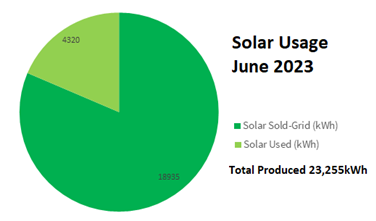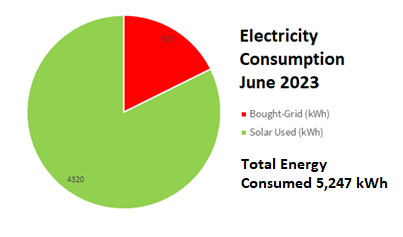Solar Panel Installation Is Forecast To Generate >250% of Bisca’s Energy Requirements
Priding ourselves on being an environmentally conscious business, Bisca’s directors are constantly looking at new initiatives which will work to neutralise the business’ carbon footprint and reduce its impact on the planet. Whilst energy security has never been so uncertain and prices are rising to levels that many businesses cannot withstand; the subsequent burning of fossil fuels for energy production continues to intensify the effects of global warming.
Why A Rooftop Solar Panel Installation
Bisca is fortunate to occupy two large workshops and office space at our HQ premises based in Helmsley, North Yorkshire. Given the detrimental effects of both the environmental and energy crises we face, it seemed inevitable that we should consider the viability of powering our business in a more sustainable way. Following initial research into a rooftop solar panel installation, a clear business case was established – highlighting three obvious incentives for making the investment:
To become a more environmentally sustainable business operation and reduce energy costs, by optimising our production and consumption of renewable energy.
To create surplus solar power for export back to the grid, helping others to reduce their environmental impact, and using the income to offset Bisca’s capital investment.
To inspire other businesses, who are looking for a more sustainable and cost-effective source of electricity, to invest in solar power.
Our Solar Potential
The process began with submitting a proposal in May 2021 for the solar panel installation of a 171kWp (kilowatt peak) system on Bisca’s rooftops in Helmsley. Approval was gained from the District Network Operator (DNO) (in our case Northern Powergrid), with initial studies confirming a connection to the grid would be possible, albeit some upgrades were required due to the scale of the project.
Bisca was required to pay for these improvements and so further analysis was carried out, which indicated the project remained commercially sound. It was agreed the solar PV system would be funded from company reserves, offering a pay-back period at this stage of 5.7 years, from the date the panels would be switched on. Bearing in mind the lifespan of the panels is 25 years which require very little maintenance over this time, the return offered on this project were long-term.
The proposed system was designed to maximise the environmental benefits it would offer; covering both rooftops which comprised 218 panels at 88kWp being placed on the main workshop; and the office building / second workshop contributing 83kWp over a further 206 panels. The total capacity of the panels was forecast to generate 133,300 kWh (kilowatt hours) of solar power each year; which is over 250% of Bisca’s own electricity requirements.
The Rewards So Far
Initially overcladding was fitted to the existing roofs, containing additional insulation for improved heat regulation. This was followed by the installation of the solar panel systems in November 2021 which took six weeks to complete. Due to various challenges relating to gaining a grid connection and setting up a power purchase agreement, the solar panels were switched on in May 2022.
Revenue Generated
Bisca’s forecasted electrical power consumption is 52,500 kWh per year, leaving an estimated 60%+ (circa 80,000 kWh) of surplus green energy to be sent back to the grid for resale to other properties. Whilst producing excess solar power optimises the environmental gain of our project, Bisca also benefits financially from the revenue generated. The tariff received by Bisca for the exported electricity has been 3p per kWh, since the panels were switched on; due to pressure placed recently on utility suppliers to offer a more realistic price, this rate has however now increased to 16.5 pence per kWh; giving an unexpected 450% upsurge in value to the business.

While the number of sunlight hours between winter and summer months can fluctuate in the UK – on average Bisca has exported 10,419kWh of solar electricity back to the grid each month from the rooftops of its buildings. Originally the export value of this electricity was worth £312.57 to the business, however due to the increased feed in tariff, its value has grown to an average of £1,719 per month. For the latest figures see the solar usage graph.
This shows a total of 23,255 kWh of electricity was produced in June 2023 from Bisca’s solar panel system. The business consumed 4,320 kWh (19%) of this, exporting a total of 18,935 kWh back to the grid, at a value of £3,124 that month.
Electricity Costs
Bisca’s electricity consumption over the latest quarter (April – June 2023) reached 13,728 kWh, so an average of 4,576 kWh each month. If this electricity had been bought from the national grid in the way most businesses source their power, Bisca would have paid the current rate of 24p per kWh so £1,098 each month.

Due to Bisca’s solar investment, data is showing that since April this year, an average of 84% of the electricity we’ve consumed has been supplied by the sun, with no charge. This has reduced the amount of electricity bought in from the grid to just 747 kWh each month; bringing a saving to the business in electricity costs of £919 monthly. For the latest figures, see the electricity consumption graph.
The data shows out of a total of 5,247 kWh of electricity consumed in June 2023, 82% of this came from Bisca’s solar panels, reducing energy costs by £1,037 that month.
Payback Period
When Bisca’s solar investment was first evaluated in 2021, it was estimated it would take 5.7 years for the expense of the project to be fully recompensed. Six months after the panels became operational, the payback timeframe had reduced to 5 years, and following further analysis in July 2023, the period in which the panels will start generating a profit has again fallen to just over 4 years. There are four elements to be considered in making an accurate payback calculation:
Solar Power Used
Due to the dramatic rise in energy prices over the past 12 months, Bisca continues to see a far more favourable outcome from its solar project than originally expected. Electricity costs to the business have been reduced by an average of £919 per month, realising an attractive cash flow gain to the business. Bisca is also free from the risk of continuous electricity price rises in future.
Solar Power Exported
The increased export tariff to 16.5p per kWh has made a positive impact on payback calcuations, bringing an additional average revenue of £1,719 each month to the business – whilst further de-risking the investment and making the decision to install solar for other businesses in future, so much easier.
Corporation Tax Relief
The government enhances the value of solar investments by 125%. Bisca therefore benefits from tax relief on its original expense of £155K, plus £39K of enhanced value, so a total of £194K. This bought a one-off reduction in Corporation Tax of £37K.
Electric Car Charging
It’s also worth noting Bisca’s transition to electric vehicles, meaning staff and customers can now recharge their vehicles at our premises at no cost. With the aim of future proofing our business, reducing our environmental impact and removing high fuel costs, we have to date installed three chargers on site.
A Worthwhile Investment?
Bisca approached its rooftop solar project with caution and following a detailed evaluation, was confident from the outset that there existed a sound business case. Whilst it was impossible to predict the significant rise in energy prices when the project began, the potential benefits – not just from an environmental perspective, but also a commercial one – were never in doubt.
The changes to the energy market over the last year have had a dramatic impact on businesses, sadly causing many to struggle, or at worst forcing some to permanently close their doors. Conversely, for those who have invested in renewable forms of energy production – such as rooftop solar panels – these same adverse conditions are in fact driving efficiency, reducing overheads and offering a genuine competitive advantage.
In the midst of both the environmental and economic crises we currently face – where neither is set to improve in the near future – surely there has never been a better time to consider investing in sustainable and renewable energy production, such as rooftop Solar PV.










